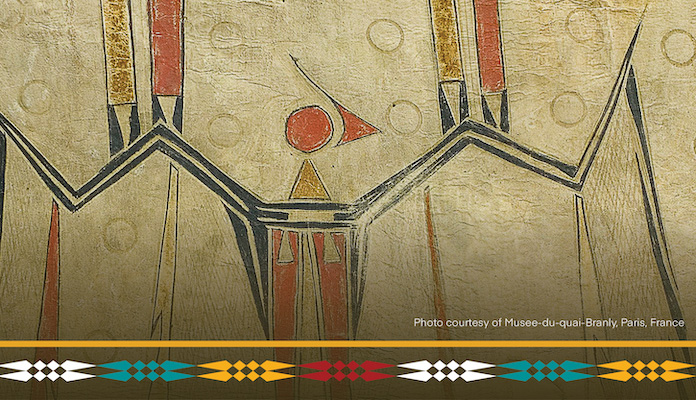
2024 Myaamiaki Conference
The 10th biennial Myaamiaki Conference was held on Saturday, May 4, from 9:00 a.m.-4:00 p.m. in the John Dolibois Room at Miami University's Shriver Center.
2024 Conference Presentation Schedule
9:00 a.m. | Introduction and Opening Song
Performed by Haley Shea, Kara Strass, Kristina Fox, George Strack, George Ironstrack, and Jarrid Baldwin
9:15 a.m. | Opening Remarks
Daryl Baldwin, Executive Director, Myaamia Center at Miami University
Watch the Videos:
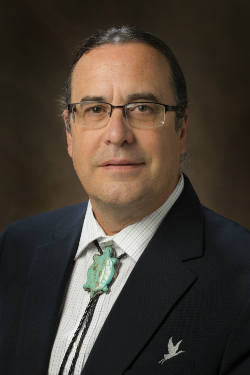 Daryl Baldwin is a citizen of the Miami Tribe of Oklahoma and currently serves as the Executive Director of the Myaamia Center at Miami University in Oxford, Ohio. He has worked with the Myaamia people developing language and cultural materials since 1995. Learn more about Daryl.
Daryl Baldwin is a citizen of the Miami Tribe of Oklahoma and currently serves as the Executive Director of the Myaamia Center at Miami University in Oxford, Ohio. He has worked with the Myaamia people developing language and cultural materials since 1995. Learn more about Daryl.
9:30 a.m. | National Breath of Life Apprenticeship Program, Apprentice Panel
Gabriela Pérez Báez, Ph.D., Assistant Professor in the Linguistics Department, University of Oregon
Jerome Viles, National Breath of Life Workshop Coordinator, Myaamia Center
Watch the Videos:
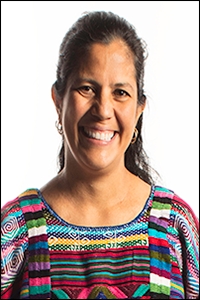 Dr. Gabriela Pérez Báez is an academic expert in indigenous languages and language revitalization. Gabriela served as curator of Linguistics at the National Museum of Natural History, Smithsonian Institution and in its Recovering Voices initiative. Her research centers on revitalization practices around the world. In her native Mexico, Gabriela works with Zapotec communities and has published on migration and language vitality, verbal inflection and derivation, semantic typology, and language and cognition. Gabriela is the compiler of two dictionaries of Isthmus Zapotec within a participatory and interdisciplinary model. She holds a doctorate in linguistics from the University at Buffalo.
Dr. Gabriela Pérez Báez is an academic expert in indigenous languages and language revitalization. Gabriela served as curator of Linguistics at the National Museum of Natural History, Smithsonian Institution and in its Recovering Voices initiative. Her research centers on revitalization practices around the world. In her native Mexico, Gabriela works with Zapotec communities and has published on migration and language vitality, verbal inflection and derivation, semantic typology, and language and cognition. Gabriela is the compiler of two dictionaries of Isthmus Zapotec within a participatory and interdisciplinary model. She holds a doctorate in linguistics from the University at Buffalo.
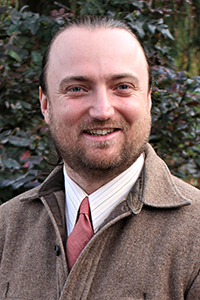
Jerome specializes in archival language research and works with members of his family and community to bring language from archives back into daily use. Since 2016, he has worked as part of a team at the Northwest Indian Language Institute (NILI) to build a digital archive of Nuu-wee-ya’ archival language materials. These efforts have been supported through partnership with the Myaamia Center. This partnership resulted in his team’s creation of the Nuu-da’ Mv-ne’ Digital Archive hosted on the Myaamia Center’s Indigenous Languages Digital Archive (ILDA) platform. Jerome is currently with the Myaamia Center as the Breath of Life Workshop Coordinator working to provide ILDA to other Native American communities engaged in archives-based language revitalization.
Since 2011, the National Breath of Life (NBoL) has provided training to more than 60 tribal communities engaged in archive-based language revitalization. In 2014, the Myaamia Center became the institutional home for National Breath of Life in order to provide long-term stability and development to the program.
Today, NBoL is the only nationally focused program in the United States to advance archive-based revitalization across Indian Country. Started in 2022, and with support from the National Endowment for the Humanities and Mellon Foundation, the NBoL Apprenticeship Program has provided support and ongoing training to community language workers from ten tribal communities from across the country.
Apprentices worked with their communities to design meaningful archival language projects for their two years in the program and have made significant progress towards achieving their goals. Their projects range from transcription of original archival documents in order to build a community-curated archive using the Indigenous Languages Digital Archive (ILDA) software to utilizing contemporary audio and video to populate their ILDA dictionaries.
Their important work for their communities supports their tribes’ language and cultural revitalization efforts, much as the Myaamia Center’s archival work supports the Miami Tribe community. In this presentation, we will provide an overview of NBoL’s work and hear from several of the apprentices in a moderated panel about their experiences and work with NBoL.
10:15 a.m. | The Development of Nahi Meehtohseeniwinki: A Myaamia Living Well Model
Haley Shea, Ph.D., Co-Director Office of Assessment and Evaluation, Myaamia Center, and Licensed Psychologist
Paul Branscum, Ph.D., Professor Kinesiology, Nutrition and Health, Myaamia Center Faculty Affiliate
Watch the Videos:
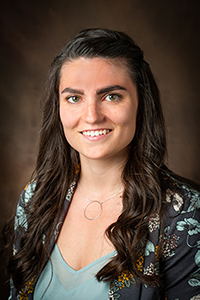 Dr. Haley Shea (kiišikohkwa), a citizen of the Miami Tribe of Oklahoma, attended Miami University for her undergraduate career, participating in the Myaamia Heritage course. She completed her M.S. and Ph.D. at Iowa State University and a predoctoral internship at Miami University's Student Counseling Service. Haley is currently the co-director of the Office of Assessment and Evaluation (OAE), examining the many factors that have contributed to positive outcomes (e.g. community engagement, attendance at tribal events, sense of belongingness, etc.) within the Myaamia community.
Dr. Haley Shea (kiišikohkwa), a citizen of the Miami Tribe of Oklahoma, attended Miami University for her undergraduate career, participating in the Myaamia Heritage course. She completed her M.S. and Ph.D. at Iowa State University and a predoctoral internship at Miami University's Student Counseling Service. Haley is currently the co-director of the Office of Assessment and Evaluation (OAE), examining the many factors that have contributed to positive outcomes (e.g. community engagement, attendance at tribal events, sense of belongingness, etc.) within the Myaamia community.
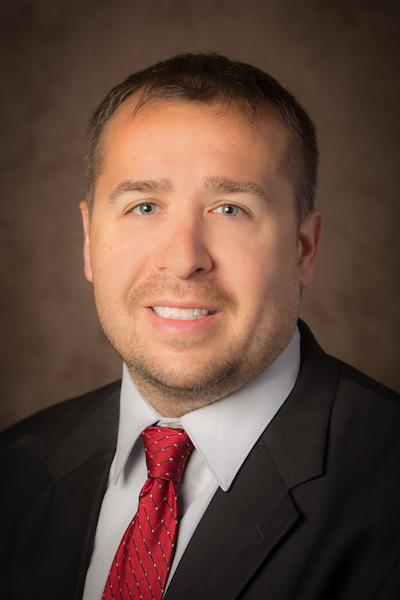 Dr. Paul Branscum is a Professor of Public Health in the Department of Kinesiology, Nutrition & Health. He is a registered dietitian, earning his B.S. in Human Nutrition (2005) and M.S. in Nutrition (2008) at The Ohio State University. He then earned his Ph.D. in Health Promotion & Education from the University of Cincinnati in 2011. Dr. Branscum works as an Affiliate Professor in the Office of Assessment and Evaluation (OAE) in the Myaamia Center. He was invited to work with the team in 2021 when they were preparing for a project to evaluate Nahi Meehtohseeniwinki among the citizens of the Miami Tribe of Oklahoma and he has since become more involved with the other assessments performed by the OAE.
Dr. Paul Branscum is a Professor of Public Health in the Department of Kinesiology, Nutrition & Health. He is a registered dietitian, earning his B.S. in Human Nutrition (2005) and M.S. in Nutrition (2008) at The Ohio State University. He then earned his Ph.D. in Health Promotion & Education from the University of Cincinnati in 2011. Dr. Branscum works as an Affiliate Professor in the Office of Assessment and Evaluation (OAE) in the Myaamia Center. He was invited to work with the team in 2021 when they were preparing for a project to evaluate Nahi Meehtohseeniwinki among the citizens of the Miami Tribe of Oklahoma and he has since become more involved with the other assessments performed by the OAE.
In 2021 the Nipwaayoni Acquisition and Assessment Team (NAATeam) at the Myaamia Center received funding for a project to develop a Myaamia-specific model of wellness (Nahi Meehtohseeniwinki), and a way to measure Nahi Meehtohseeniwinki amongst tribal citizens. We undertook this project because health-based research in Indigenous communities historically has been rooted in a deficit and pan-Indian perspective, only identifying health problems across Indigenous communities and thus, ways to overcome them.
Our work recognizes that wellness is a culturally-specific concept rooted in community knowledge systems, and for the Miami Tribe of Oklahoma it is the strength of that knowledge and resulting cultural expression, not our problems, that help us achieve wellness as a tribal community. We hope this project helps the community by bringing to light various factors that help us live well. Additionally, we hope to include concepts of Nahi Meehtohseeniwinki into tribal educational curricula, and to measure Nahi Meehtohseeniwinki for tribal-initiated reasons.
This presentation will: Describe the process the team took to create the Myaamia Nahi Meehtohseeniwinki model. Outline the many factors that contribute to Myaamia Nahi Meehtohseeniwinki. Provide tangible examples of how this model might be used within the community. Share the scale construction and validation process to develop an initial tool to measure Nahi Meehtohseeniwinki.
11:00 a.m. | Minohsayaki ‘Painted Robes:’ A Peewaalia and Myaamia Story of Reclamation
Charla EchoHawk, Director of Cultural Preservation, Peoria Tribe of Indians of Oklahoma
George Ironstrack, Assistant Director and Director of Education, Myaamia Center at Miami University
Robert Morrissey, Ph.D., Director of Graduate Studies at the University of Illinois, Urbana-Champaign
Watch the Videos:
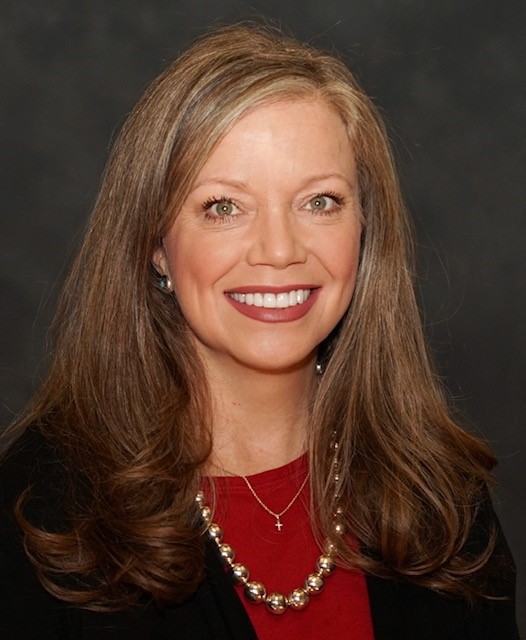 Charla EchoHawk is a citizen of the Peoria Tribe of Indians of Oklahoma and serves as the Director of Cultural Preservation for the Peoria Tribe.
Charla EchoHawk is a citizen of the Peoria Tribe of Indians of Oklahoma and serves as the Director of Cultural Preservation for the Peoria Tribe.
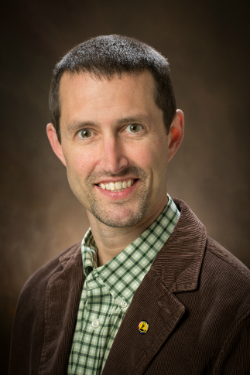 George Ironstrack (meemeehšhkia) is a citizen of the Miami Tribe of Oklahoma and serves as the Director of the Education Office of Myaamia Center at Miami University in Oxford, Ohio. George has participated in Myaamia language and culture renewal projects as both a student and a teacher since the mid-1990s. Learn more about George.
George Ironstrack (meemeehšhkia) is a citizen of the Miami Tribe of Oklahoma and serves as the Director of the Education Office of Myaamia Center at Miami University in Oxford, Ohio. George has participated in Myaamia language and culture renewal projects as both a student and a teacher since the mid-1990s. Learn more about George.
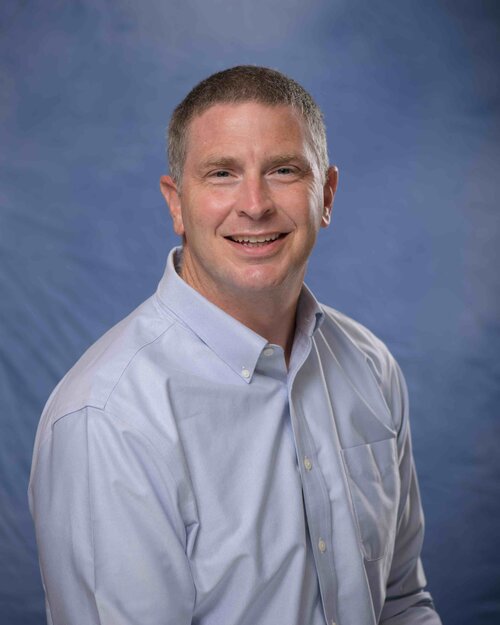 Dr. Robert Morrissey is a Professor of History and the Director of Graduate Studies at the University of Illinois, Urbana-Champaign. Dr. Morrissey writes and teaches about early American frontier history and environmental history.
Dr. Robert Morrissey is a Professor of History and the Director of Graduate Studies at the University of Illinois, Urbana-Champaign. Dr. Morrissey writes and teaches about early American frontier history and environmental history.
His recent book is People of the Ecotone: Environment and Indigenous Power at the Center of Early America, which is an environmental and cultural history of the tallgrass prairie region of North America in pre-modern times. Learn more about Dr. Morrissey.
Minohsayaki ‘painted hide robes’ are an art form that was practiced prior to contact with Europeans. Minohsaya artists produced many beautiful examples in the late 1600s into the early 1700s. A few minohsayaki were given as gifts to French diplomats or purchased by French fur traders. Eventually, these minohsayaki found their way into the collections of the French royal family. In the mid-1700s, the artistic practice of producing minohsayaki declined as European trade fabrics and materials gradually replaced the wearing of tanned and painted leather.
Beginning in 2020, a team from the Peoria Tribe of Indians of Oklahoma and the Miami Tribe of Oklahoma together with non-Native scholars have been working to reconnect with the minohsayaki that are cared for in the collections of the Musée du quai Branly - Jacques Chirac in Paris, France. This work is called “Reclaiming Stories,” because the team seeks not only to reclaim the practice of hide painting within our communities, but also to reconnect those practices with the stories that are essential to who we are as a people.
This presentation will address the origins of the project, summarize the group’s experiences learning the skills necessary to creating minohsayaki, and describe the impact that this work is having on the Peewaalia ‘Peoria’ and Myaamia ‘Miami’ communities.
11:30 a.m. | Break – Visit Presenter Tables
12:00 p.m. | Lunch on Your Own
1:30 p.m. | Aanchtaakia Milonweeyoni: Reflections on my Aanchtaakia Fellowship
Jared Nally, Aanchtaakia Fellow, Myaamia Center and Graduate Student with the Institute of Environmental Sustainability.
Watch the Videos:
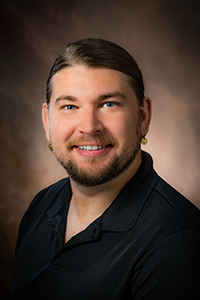 Jared Nally (ahsapa) is a citizen of the Miami Tribe of Oklahoma. Jared received a B.A. in Indigenous and American Indian Studies from Haskell Indian Nations University in 2021 and is finishing an M.S. in Environmental Science and a graduate certificate in conservation biology at Miami University.
Jared Nally (ahsapa) is a citizen of the Miami Tribe of Oklahoma. Jared received a B.A. in Indigenous and American Indian Studies from Haskell Indian Nations University in 2021 and is finishing an M.S. in Environmental Science and a graduate certificate in conservation biology at Miami University.
Jared is an Aanchtaakia Graduate Fellow, and his graduate studies focus on the intersections of Myaamia culture and ecology. Jared's community role as a Myaamia weaver serves as a foundation for how he approaches Myaamia ethnoecology.
The Myaamia word “aanchtaakia” carries the meaning “change maker.” As an Aanchtaakia Graduate Fellow that meaning resonates with personal growth during my time at Miami University and the belief I will bring positive change to my tribal community upon graduation. The “change maker” focus of the fellowship centered my interests and growth as a student, and how to bring them into community.
In my reflection as a graduate fellow, I look back on my work with Myaamia textiles, history, culture, and ecology and how the intersections of that work was fostered here at Miami University’s Institute for the Environment and Sustainability under the direction of the Myaamia Center and Miami Tribe of Oklahoma.
2:15 p.m. | From Research to Household: How Research Turns into Cultural Education Materials
Nate Poyfair, Special Project Researcher/ARPA Noošonke Manager, Cultural Resources Office, Miami Tribe of Oklahoma
Joshua Sutterfield, Cultural Education Director, Cultural Resources Office Miami Tribe of Oklahoma
Watch the Videos:
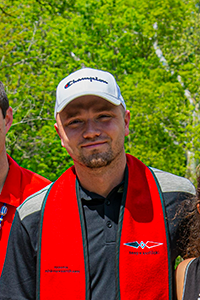 Nate Poyfair (peepinšihšia) is Myaamia citizen and a current Miami Tribe of Oklahoma employee at the Cultural Resources Office where he holds the Project Manager position.
Nate Poyfair (peepinšihšia) is Myaamia citizen and a current Miami Tribe of Oklahoma employee at the Cultural Resources Office where he holds the Project Manager position.
Nate graduated from Miami University in 2020 with a Bachelor of Arts Degree in History.
Nate has a passion for growing intertribal relationships, cultural outreach, and community building.
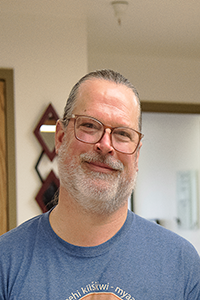 Joshua Sutterfield (neewilenkwanka) is a citizen of the Miami Tribe of Oklahoma and has been an active member of the Tribe's language and culture revitalization effort for over twenty years as a student, teacher, and now as the Tribe's Cultural Education Director.
Joshua Sutterfield (neewilenkwanka) is a citizen of the Miami Tribe of Oklahoma and has been an active member of the Tribe's language and culture revitalization effort for over twenty years as a student, teacher, and now as the Tribe's Cultural Education Director.
Joshua graduated from Miami University with bachelor's degrees in Comparative Religion and Anthropology in 2005 and a master’s degree in Cultural Geography in 2009. He is currently ABD in Anthropology at the University of Arkansas.
During this presentation, we will discuss how the research produced by the Miami Tribe of Oklahoma, specifically through the Myaamia Center, is used to create materials for cultural education. We will highlight one of our latest projects, myaamia kiilhsooki: Myaamia Moons, Seasons, & Years, showing how previous research led to the publication and dissemination of this new book. We will also show how this research is used in other spaces to produce cultural education presentations and interactive materials.
3:00 p.m. | Myaamia Student Experience at Miami University, A Student Panel
Kara Strass, Director of Miami Tribe Relations, Myaamia Center at Miami University
Haley Shea, Ph.D., Co-Director of the Office of Assessment and Evaluation, Myaamia Center at Miami University
Watch the Videos:
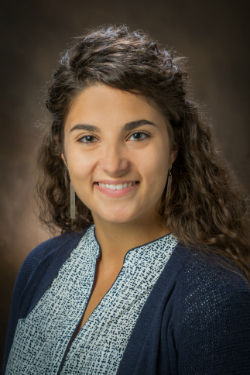 Kara Strass (mahkoonsihkwa), is a citizen of the Miami Tribe of Oklahoma. Kara received an M.S. in Student Affairs in Higher Education from Miami University in 2016. Kara’s graduate studies focused on Student Development Theory, and specifically how these theories can be applied to make Myaamia students successful in their college endeavors. Kara serves as the liaison between the Miami Tribe of Oklahoma and Miami University, as well as an advisor and mentor to the Myaamia Heritage Program students.
Kara Strass (mahkoonsihkwa), is a citizen of the Miami Tribe of Oklahoma. Kara received an M.S. in Student Affairs in Higher Education from Miami University in 2016. Kara’s graduate studies focused on Student Development Theory, and specifically how these theories can be applied to make Myaamia students successful in their college endeavors. Kara serves as the liaison between the Miami Tribe of Oklahoma and Miami University, as well as an advisor and mentor to the Myaamia Heritage Program students.
 Dr. Haley Shea (kiišikohkwa), a citizen of the Miami Tribe of Oklahoma, attended Miami University for her undergraduate career, participating in the Myaamia Heritage course. She completed her M.S. and Ph.D. at Iowa State University and a predoctoral internship at Miami University's Student Counseling Service. Haley is currently the co-director of the Office of Assessment and Evaluation (OAE), examining the many factors that have contributed to positive outcomes (e.g. community engagement, attendance at tribal events, sense of belongingness, etc.) within the Myaamia community.
Dr. Haley Shea (kiišikohkwa), a citizen of the Miami Tribe of Oklahoma, attended Miami University for her undergraduate career, participating in the Myaamia Heritage course. She completed her M.S. and Ph.D. at Iowa State University and a predoctoral internship at Miami University's Student Counseling Service. Haley is currently the co-director of the Office of Assessment and Evaluation (OAE), examining the many factors that have contributed to positive outcomes (e.g. community engagement, attendance at tribal events, sense of belongingness, etc.) within the Myaamia community.
Myaamia students who attend Miami University as part of the Myaamia Heritage Award Program have a common experience that unites them as a community. The goals of the program are to connect them with other Myaamia people and to connect them to their Myaamia knowledge system, primarily through the Myaamia Heritage Course. However, in addition to the educational component, research by the Nipwaayoni Acquisition and Assessment Team (NAATeam) has revealed that the experience also helps students grow in their understanding of their Myaamia identity, connect to the Tribal community, foster academic attainment, and increase their general pride as a Myaamia person.
4:00 p.m. | Daryl Baldwin - Closing Comments
4:15 p.m. | Visit Presenter Tables
Related Events
Myaamia Maple Syrup Lunch – Friday, May 3rd
Presented by Miami Dining in partnership with the Myaamia Center, this special event at Maplestreet Dining Commons celebrates the end of maple syrup season. Enjoy a delicious menu featuring Maple Roasted Carrots, Maple Glazed Pork Loin with Apple Chutney, and more.
- Date: Friday, May 3, 2024
- Time: 11:00 am
- Cost: $12.99
- Location: Maplestreet Dining Commons, 571 Maple Street, Oxford, Ohio
Myaamia Classroom Openhouse – Friday, May 3rd
In celebration of the 50th anniversary between the Miami Tribe and Miami University, President Crawford gifted a classroom to the Miami Tribe to use for our Myaamia Heritage classes and community programming.
Join us as we unveil the classroom for the first time, decorated with Myaamia artwork and education materials. Light refreshments will be provided.
- Date: Friday, May 3, 2024
- Time: 2 - 4 p.m.
- Location: Room 212, Macmillan Hall, 531 E Spring St, Oxford, Ohio
Minohsayaki ‘Painted Robes’ Exhibit – Friday and Saturday, May 3rd and 4th
We encourage you to explore the Minohsayaki 'Painted Robes': A Peewaalia and Myaamia Story of Reclamation exhibit currently on display at the Richard and Carole Cocks Art Museum on campus. This exhibition presents the special collaboration between the Peewaaliaki and Myaamiaki, along with non-Native scholars, that began in 2020.
- Museum Hour: Friday: 10 a.m. - 5 p.m.
- Saturday: Noon - 5 p.m.
- Sunday: Closed
- Location: Richard and Carole Cocks Art Museum, 801 S Patterson Ave, Oxford, OH
